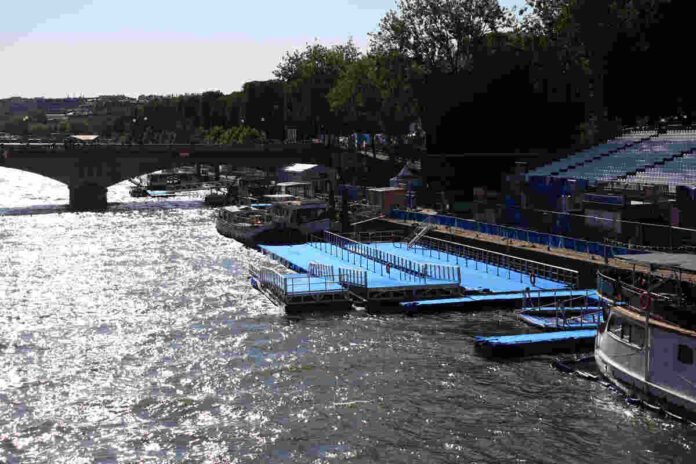The recent postponement of the Men’s Olympic Triathlon due to the continued contamination of the Seine River has sparked concerns among athletes and organizers alike. Despite efforts to address the issue, the persisting unsafe swimming conditions raise questions about the feasibility of hosting aquatic events in urban waterways. As the event rescheduling unfolds, it prompts a broader conversation about the intersection of environmental challenges and sporting competitions, shedding light on the complexities of ensuring athlete safety in an increasingly polluted world.
Event Rescheduling
The rescheduling of the Men’s Olympic Triathlon, initially planned for Tuesday morning, was necessitated by unsafe swimming conditions in the Seine River, prompting organizers to postpone the event to Wednesday following the Women’s Triathlon.
This adjustment in event logistics was essential to guarantee athlete safety, as World Triathlon reported some swim course points exceeded acceptable contamination levels.
Organizers emphasized prioritizing the health and well-being of the participants above all else, highlighting their commitment to providing a safe competition environment.
A contingency plan is in place, with a potential further postponement to Friday if required.
Water Quality Concerns
Amidst the anticipation and preparations for the Men’s Olympic Triathlon, significant concerns have arisen regarding the water quality in the Seine River, casting a shadow of uncertainty over the upcoming competition.
Elevated E. coli levels have indicated high fecal contamination, posing risks to athlete safety and well-being. Recent monitoring revealed spikes in contamination after heavy rain, with levels at certain points exceeding acceptable limits for safe swimming.
The presence of unsafe fecal matter raises concerns about potential gastrointestinal diseases and underscores the importance of water safety measures.
Despite significant investments and cleanup efforts, achieving ideal conditions for the competition has proven challenging, highlighting the complex nature of addressing water quality concerns in urban environments.
Cleanup Challenges
Concerns surrounding the water quality in the Seine River have underscored the formidable challenges faced in the cleanup efforts for the Men’s Olympic Triathlon.
Despite Paris and local agencies investing $1.5 billion in cleanup strategies, contamination solutions are proving elusive.
Upgrades such as retrofitting sewer systems and constructing an underground stormwater basin were implemented, aiming to achieve safe swimming conditions.
However, historical prohibitions on swimming in the Seine persist, highlighting the complexity of the situation.
The failure to meet initial hopes for water quality improvements has raised doubts about the effectiveness of the cleanup efforts.
As the event’s postponement demonstrates, finding lasting solutions to the contamination issues remains a significant challenge for organizers and authorities.
Weather’s Role
Weather conditions have played an essential role in impacting the water quality and cleanup efforts for the Men’s Olympic Triathlon in the Seine River.
Sunlight, a natural bacteria inhibitor, was vital for the cleanup process, but heavy rain post-July 20 spiked contamination levels. Clear weather was needed for successful water quality improvement, yet rain during the opening ceremony and subsequent days hindered progress.
Meteo France’s forecast of potential thunderstorms poses further challenges to the planned events. Organizers had to cancel swim training sessions due to the contamination, affecting athlete preparation.
The climate effects have been a significant factor in the struggle to attain safe swimming conditions for the triathlon and other water-based competitions reliant on improved water quality.
Public Perception
Perceptions surrounding the water quality and safety measures implemented for the Men’s Olympic Triathlon in the Seine River have sparked widespread discussion among athletes, officials, and the public.
Public trust in the effectiveness of cleanup efforts has been called into question, with independent tests revealing contamination levels above acceptable limits.
Health implications are a significant concern, as high levels of E. coli indicate potential harmful bacteria present in the water.
Despite official statements prioritizing athlete health, skepticism lingers regarding the safety of swimming in the Seine River.
The ceremonial swim conducted despite known contamination levels has further fueled public unease.
This situation highlights broader global apprehensions about the safety of urban waterways, underscoring the importance of transparency and effective measures to address public health concerns.


